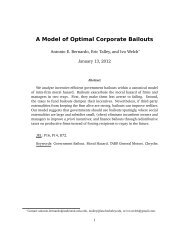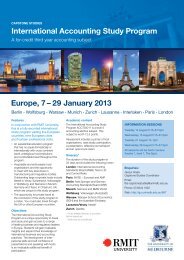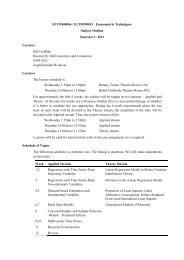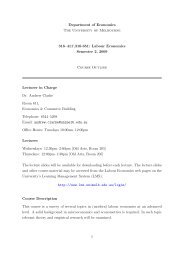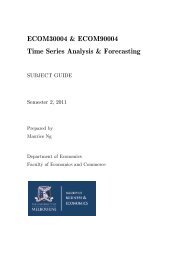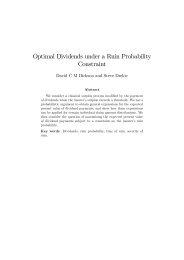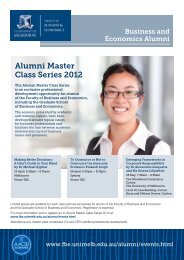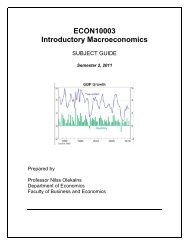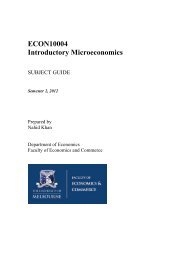Course Planning Guide 2012 - Faculty of Business and Economics
Course Planning Guide 2012 - Faculty of Business and Economics
Course Planning Guide 2012 - Faculty of Business and Economics
You also want an ePaper? Increase the reach of your titles
YUMPU automatically turns print PDFs into web optimized ePapers that Google loves.
<strong>Economics</strong> major + Management or Marketing majors<br />
<strong>Economics</strong> major + Finance major + breadth in Mathematics<br />
Year 1 Year 2 Year 3<br />
ECON10004 Introductory<br />
Microeconomics<br />
ECON20003 Quantitative<br />
Methods 2 or ECOM20001<br />
Introductory Econometrics<br />
ECON30010 Microeconomics<br />
ECON10005 Quantitative<br />
Methods 1<br />
Commerce elective e.g.<br />
MGMT10002 Managing <strong>and</strong><br />
Leading Organisations<br />
ECON20002 Intermediate<br />
Microeconomics<br />
Commerce elective or breadth<br />
ECOM30001 Basic<br />
Econometrics or ECOM30002<br />
Econometrics<br />
Level-3 management or<br />
marketing elective<br />
Breadth Breadth Commerce elective or breadth<br />
ECON10003 Introductory MGMT20001 Organisational ECON30009 Macroeconomics<br />
Macroeconomics<br />
Behaviour<br />
Commerce elective<br />
MKTG10001 Principles <strong>of</strong><br />
Marketing<br />
ECON20001 Intermediate<br />
Macroeconomics<br />
Breadth<br />
Level-3 management or<br />
marketing elective<br />
Level-3 management or<br />
marketing elective<br />
Breadth Commerce elective or breadth Commerce elective or breadth<br />
Key / Legend<br />
Compulsory subjects<br />
Commerce elective<br />
or breadth<br />
Management or<br />
Marketing subjects<br />
<strong>Economics</strong> subjects<br />
Commerce elective<br />
Breadth subjects<br />
The above example shows how you can complete a major in economics as well as a management or marketing major. This<br />
example also meets entry requirements into Honours for economics, management <strong>and</strong> marketing. Subjects which can be taken<br />
in these majors are listed on page 15 (management major) <strong>and</strong> page 16 (marketing major).<br />
There are requirements for the maximum <strong>and</strong> minimum number <strong>of</strong> commerce <strong>and</strong> breadth points students must complete at certain<br />
levels. You must account for these when selecting your subjects. See page 6 for more information.<br />
Year 1 Year 2 Year 3<br />
ECON10004 Introductory<br />
Microeconomics<br />
FNCE10001 Finance 1<br />
ECON20002 Intermediate<br />
Microeconomics<br />
MAST20006 Probability for<br />
Statistics<br />
ECON30010<br />
Microeconomics<br />
ECOM30002<br />
Econometrics<br />
MAST10005 Calculus 1 FNCE20001 <strong>Business</strong> Finance FNCE30007 Derivative<br />
Securities<br />
Commerce elective<br />
Commerce elective or breadth e.g.<br />
MAST20026 Real Analysis with<br />
Applications<br />
FNCE30001 Investments<br />
ECON10003 Introductory<br />
Macroeconomics<br />
ECON20001 Intermediate<br />
Macroeconomics<br />
ECON30009<br />
Macroeconomics<br />
MAST10006 Calculus 2 MAST20005 Statistics FNCE30002 Corporate<br />
Finance<br />
MAST10007 Linear Algebra<br />
Commerce elective<br />
Commerce elective or breadth e.g.<br />
MAST20018 Discrete Maths &<br />
Operations Research<br />
MGMT20001 Organisational<br />
Behaviour<br />
Commerce elective or<br />
breadth e.g. MAST30022<br />
Decision Making<br />
Commerce elective or<br />
breadth<br />
Key / Legend<br />
Compulsory subjects<br />
(including quantitative<br />
subjects counting as<br />
breadth)<br />
Finance subjects<br />
<strong>Economics</strong> subjects<br />
Commerce elective<br />
Breadth subjects<br />
Commerce elective or<br />
breadth<br />
The above example illustrates how students can pursue a double major in economics <strong>and</strong> finance, meet entry requirements<br />
to Honours in either discipline, take mathematics as breadth, <strong>and</strong> follow the mathematics path for satisfying the quantitative<br />
requirement <strong>of</strong> the Bachelor <strong>of</strong> Commerce. <strong>Course</strong> plans such as this one should be considered by students who have an aptitude<br />
for <strong>and</strong> enjoy mathematics, <strong>and</strong> who wish to study valuable complementary subjects in mathematics as part <strong>of</strong> their breadth<br />
component.<br />
There are requirements for the maximum <strong>and</strong> minimum number <strong>of</strong> commerce <strong>and</strong> breadth points students must complete at certain<br />
levels. You must account for these when selecting your subjects. See page 6 for more information.<br />
DISCLAIMER: This information was true <strong>and</strong> correct at the time <strong>of</strong> printing. Please check the <strong>2012</strong> H<strong>and</strong>book at www.unimelb.edu.au/h<strong>and</strong>book for specific course<br />
requirements including subject prerequisites <strong>and</strong> availability.<br />
DISCLAIMER: This information was true <strong>and</strong> correct at the time <strong>of</strong> printing. Please check the <strong>2012</strong> H<strong>and</strong>book at www.unimelb.edu.au/h<strong>and</strong>book for specific course<br />
requirements including subject prerequisites <strong>and</strong> availability.<br />
19<br />
20



